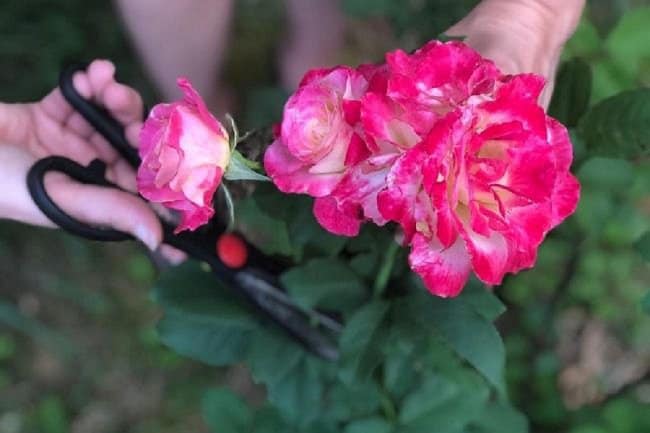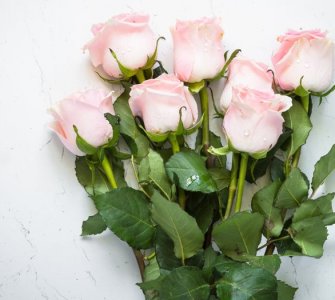Roses are often notoriously tricky to grow, and even harder to keep alive! They are frequently susceptible to all kinds of diseases. So if you don’t want your hard gardening work to go to waste, and you’re determined to create and cultivate gorgeous roses bushes, you’re going to need to know how to keep your roses disease-free.
If you want to keep roses disease free, you’re going to need ensure that your rose has optimum conditions for growth. This includes finding the correct positioning for your rose bush or plant, ensuring your plant has the correct amounts of sunshine and water, and making sure it’s planted with complimentary companion plants.
To keep your rose disease-free, you’ll want to make sure that you’re taking care of your rose according to the particular needs of your specific variety, that you’re pruning your rose properly, and that you’re taking care of your plant properly as each season dictates. Finally, if you want to know how to keep roses disease free, you’ll want to ensure you can identify signs of rose disease, so that you can treat it as soon as possible.
If you follow these steps, you should end up with a rose bush or plant that flourishes, and that lasts for years and years.
Table of Contents
How To Prevent Diseases In Your Rose Plant
Help Your Rose To Get More Sunlight
If you struggle keeping roses alive, something as simple as moving it to another spot can help alleviate the problem. Your rose might need more sun, less shade, or perhaps simply a cooler or less wind-exposed spot to stay healthy. To find out what your rose specifically needs, you’ll need to look up your particular variety of rose, as different varieties have varying needs.
In general, your rose needs to be a sunny spot where it receives around 8 hours sunshine per day, on average. Don’t worry if you live somewhere less sunny and warm – roses can still thrive as long as they get lots of light, although for optimum growth, sunshine is recommended. Where we live here in the med roses bloom almost all year round due to the sunshine – we have the opposite problem of struggling with too much heat and sunshine and all our water for our plants evaporating before our roses can drink it up!
Sunlight helps your plant to create plant food, which means it can create the nutrients needed to build a strong immune system, and fight disease naturally.
Ensure Your Rose Plant Is In The Best Position
If your rose is in a damp or dark corner of your garden, it’s not going to grow too well! Not only that, but those conditions are perfect for bugs and mould to thrive, meaning your rose can get overrun with pests and / or develop mould related diseases.
You will need to check that your rose plant’s position is correct for it’s type / variety. If your plant keeps getting signs of mould related diseases (for example, white fluff around the base of the main cane or stem) it might be a sign it’s time to move your plant. A warmer, sunnier spot will not only prevent your rose plant from getting diseases it will also encourage better growth and bigger, healthier blooms.
Plant Companion Plants To Keep Roses At Their Best
Companion plants by themselves don’t keep diseases away from your precious roses, however they do help to keep away pests. Pests, bugs, aphids – whatever you want to call them, can be extremely destructive to your rose. I know because some spider mites absolutely devastated some of my roses last year!
Pests will attack your rose, which then leave your rose vulnerable to disease. If you manage to keep the pests at bay, your rose will remain strong and healthy!
Some of the best companion plants to keep pests away and to keep your rose disease-free are
- Garlic
I know, sounds weird, but garlic is show to keep pests away, they hate the stuff! I don’t like planting it around roses as it tends to compete with rose fragrance – but if aphids are a real problem in your garden, this will definitely help keep your roses healthier! - French Marigolds
Marigold roots contain chemicals that repel most insects, and so they help keep your rose plants healthy right from the ground up. The chemical not only repels insects but it also kills fungus and bacteria right at the root. - Herbs
Herbs such as lavender, sage, and thyme repel insects in the same way as garlic – bugs simply can’t stand the scent! - Flowers that attract hummingbirds
They’re quite a rare sight, but planting flowers such as hollyhocks and daylilies around your roses attract hummingbirds. If you’re lucky enough to get hummingbirds visit your garden, not only can you be happy to have spotted such a gorgeous bird but also happy to know that they eat aphids from your roses! So flowers that attract hummingbirds can be really useful for keeping your roses healthy.
Prune Your Rose Properly
If your rose plant is not pruned properly – even the miniature ones – it will be susceptible to diseases such as black spot, mould, and mildew. To prevent these diseases on your roses, you’ll need to get handy with the shears!
Prune According To Your Rose Type
You will need to ensure that your rose plant is pruned according to it’s type – some just need a quick tidy up of dead branches and blooms every so often, others need a more vigorous cut-back.
Prune In The Springtime
Most standard sized rose bushes can be cut once a year in the spring time. This prevents any mould or damp-induced rot and diseases that may have started in the winter from harming your rose.
Use Clean, Sharp Tools
Be sure to use clean and sanitzed gardening shears for the task, and ensure that they are kept sharp. Repeated cuts are like cuts on humans, they can get infected with all kinds of diseases we don’t want!
Use A Sanitising Spray Afterwards
To prevent your rose bush from developing infections once your plant has been pruned, you can use rubbing alcohol over the areas you’ve cut. If you don’t have any, use a natural disinfectant instead – our DIY aphid repellent is perfect for this. It contains garlic which acts as a natural disinfectant and at the same time repels bugs, who might otherwise be attracted to the freshly cuts. Double win!
Cut Dead Blooms And Leaves
Although a full prune needs to be done at minimum once yearly, depending on how many blooms you have you can cut these (sometimes called deadheading), and remove any dead leaves, once weekly if desired.
Use An Aphid Repellent
When I first started growing things I didn’t even know what an aphid was! I soon found out when my poor rose started developing yellow leaves and not looking at all healthy. Turns out the best way to prevent your rose from dying from aphids is to prevent them in the first place – once they take hold, they are horrific to get rid of. They just keep coming back!
So, use an aphid repellent spray, I use aphid spray on my patio and container roses at least once a week to keep my plants healthy and the insects at bay. This simple recipe uses the basic kitchen cupboard ingredients of garlic, hot sauce and olive oil as well as some natural soap to keep aphids away, and I use it allll the time on my roses. Prevention is better than cure!
Watch Your Feeding
Roses are notoriously tricky to feed! They don’t like over, or underfeeding ( a bit like us really ) But that’s the somewhat simple and obvious part!
They also don’t like certain types of food at certain times of year – for example, feeding your roses in midsummer can cause blight, particularly on tea roses. You can spot it if your rose blooms look like they are turning brown and decaying. Your soil is at its richest in the springtime / high summer, so overdosing on nutrients can actually damage your rose plants.
How Often Should You Feed Roses?
Roses do best when given 2-4 feedings a year – but this is a general guide. You’re going to want to be aware of your particular rose plant’s needs and this depends on your rose variety, age, your soil quality, what fertiliser you are using, and more.
Some rose plants need feeding every two weeks!
Generally, for rose bushes, we recommend giving a high-nutrient feed at the start of every season, and then using natural fertiliser every few weeks inbetween. Feeding little and often will help keep your rose healthy, and disease free.
That’s all for our top tips on preventing diseases in roses and keeping them living a long and healthy life! If you’ve got any best tips on keeping your roses disease-free and healthy, we’d love to hear them – share your thoughts with our rosy readers, below!




